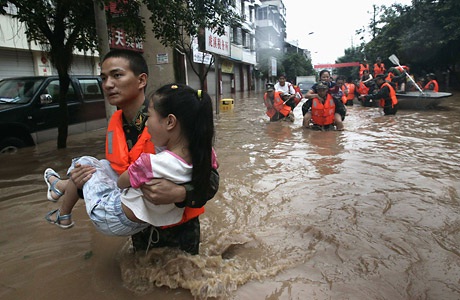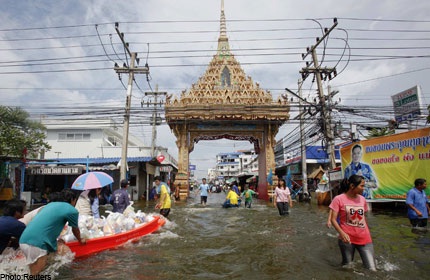| PROGRAMME | |
| DAY ONE (28 April 2014) | |
| 09:00 | Chairman's Opening Remarks |
| 09:15 | Floodways and flood prevention in Thailand |
| 10:00 | Morning Refreshments |
| 10:15 | Bangkok flood damage mitigation policy |
| 11:00 | Flood disaster awareness and risk reduction |
| 11:45 | The need for better monitoring and providing early warning alerts to alleviate and prevent flooding |
| 12:30 | Lunch |
| 14:00 | 3D GIS model for flood risk assessment due to extreme sea level rise |
| 14:45 | Waterproofing measures for new and existing buildings and critical infrastructures at risk of flooding and protecting from flood damage |
| 15:30 | Strategy to reduce vulnerability of buildings in flood prone areas and improving flood performance of buildings and critical infrastructures |
| 16:15 | Panel Discussion |
| 17:00 | End of Day 1 |
| DAY TWO (29 April 2014) | |
| 09:00 | Chairman's Opening Remarks |
| 09:15 | Factors for Thailand 2011 great flood and explaining current flooding tendency: insight and future preventive measures |
| 10:00 | Morning Refreshments |
| 10:15 | Solving flood problem and taking the best options in flood defence solution |
| 11:00 | How to rapidly plan and execute a flood infrastructure system to be resilient and adaptable |
| 11:45 | Cost estimates for flood resilience and protection strategies |
| 12:30 | Lunch |
| 14:00 | Flood risk and damage assessment using modeling and earth observation techniques |
| 14:45 | Temporary flood abatement systems: designs, implementation and reliability |
| 15:30 | Factors to consider when designing a flood protection system |
| 16:15 | Panel discussion |
| 17:00 | End of Conference |
Thailand’s successful flood prevention strategy over the last 2 years offer lessons and transforming the lessons into measures for future direction for flood prevention and mitigation across Central and Eastern Europe as well as Asia Pacific, Middle East and the region. On the other hand, current flood crisis in Thailand has emerged with a new question on the complexity and uniqueness of managing flood crisis over a long period of time. Flood disaster may not be resolved completely. It is an on-going challenge over time. This conference will offer some insights on how to tackle flood crisis and understanding flooding tendency in the future and preventive measures and strategies. What are these strategies? The Great Flood of Thailand, the worst floods in half a century, that has caused hundreds of casualties, made millions of people homeless and incurred estimated economic damage amounting to US$50 billion. There are important lessons to be learned as well as future directions for flood prevention which countries across Central & Eastern Europe may adopt. In fact, United Nations Secretary General, Ban Ki-moon urges world to learn lessons from Thailand Mega Flooding, during his visit to Thailand on 16 November 2011. In 2011, many Asian countries have witnesses flooding, including Bangladesh, China, India, Japan, Laos, North Korea, Pakistan, Thailand, the Philippines and Singapore. The economic damage has varied significantly.... minor in Singapore but very substantial in Thailand. In Thailand, the cost of the flood disaster has been estimated at US$44 billion. It is now estimated that US$72 billion will have to be invested for flood protection infrastructure, without which investors are not likely to return because of possible future flood threats and the availability of other investment locations. Reflection on 2011 Thailand’s Great Flood and learning and sharing of experiences including how to better prepare to handle future flood, how to understand what actually happen, how to identify problems and key issues and how to conceptualise future framework.
In addition, the recent floods have also exposed the effectiveness of current strategies, tactics and models to mitigate flood situation has not been effective in responding to flooding problem. From these experiences and sharing of perspective, flood disaster mitigation strategies should be based on a comprehensive assessment of the flood risk combined with a thorough investigation of the uncertainties associated with the risk assessment procedure.
Against this backdrop, this conference is a timely platform to provide sharing of ideas, perspectives and insights on some of the policy and planning that can reduce the exposure to flooding. Due to an urgent flood crisis, discussion will be extended to include Thailand. Thailand is currently hit by a repeat flood crisis after 2 years of successful implementation of flood prevention strategy. It has also emerged and became a landmark that flood crisis has no permanent solution unless a strategy that can sustain the intensity of flooding is the nearest option. Key issues to be discussed at this conference including:
|











